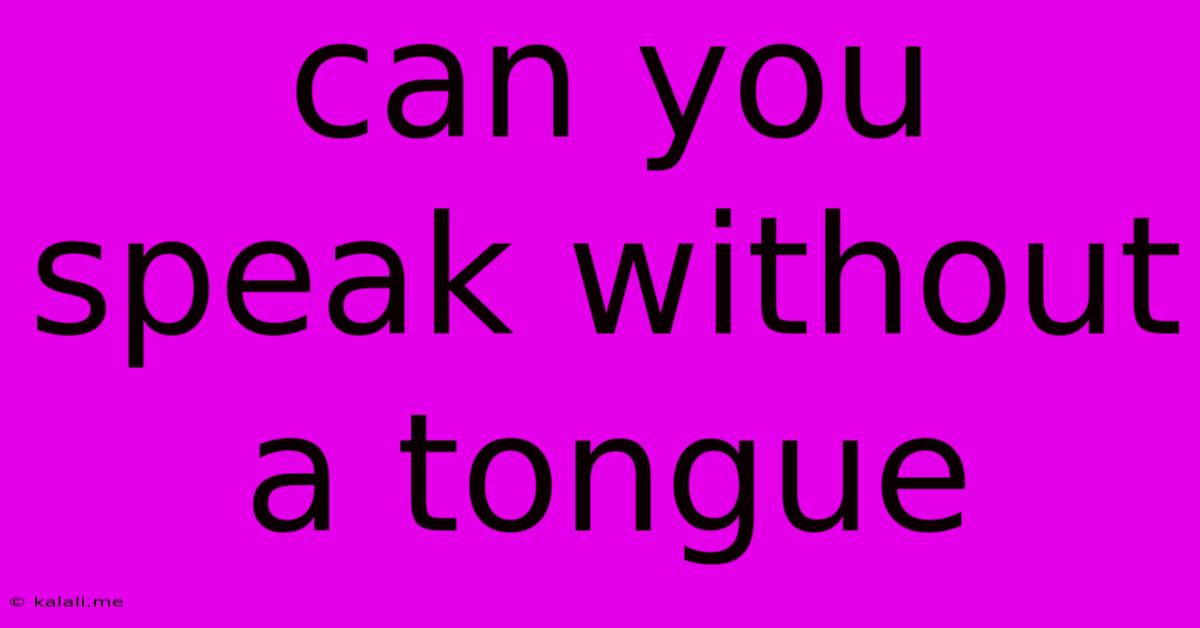Can You Speak Without A Tongue
Kalali
May 24, 2025 · 3 min read

Table of Contents
Can You Speak Without a Tongue? The Surprising Answer
Can you imagine speaking without a tongue? It sounds impossible, right? While it significantly impacts speech, the answer is surprisingly nuanced: you can still communicate, although with considerable difficulty and limitations. This article explores the complexities of speech, the role of the tongue, and the alternative communication methods available to individuals without a tongue. Understanding this will help you appreciate the intricate process of human communication and the resilience of the human spirit.
The tongue is a crucial muscle for articulation, playing a pivotal role in the production of most speech sounds. It manipulates airflow, shapes vowels and consonants, and contributes significantly to clarity and intelligibility. However, the vocal tract comprises many other structures that also participate in speech production, including the lips, teeth, palate, and vocal cords.
The Impact of Tongue Absence on Speech
Losing the tongue, whether through injury, surgery, or birth defect, presents substantial challenges to speaking. Individuals may experience:
- Significant reduction in intelligibility: Without the tongue's precise movements, sounds become muffled, slurred, and difficult to understand.
- Limited range of sounds: Certain sounds, particularly those requiring intricate tongue movements, become impossible to produce.
- Slowed speech rate: Articulation becomes more laborious, significantly reducing the speed of speech.
- Increased effort and fatigue: Speaking requires considerably more concentration and physical effort.
Alternative Communication Methods
Despite these significant challenges, individuals without a tongue can still communicate effectively using various methods. These include:
- Speech therapy and articulation exercises: Specialized therapies can help individuals maximize their residual speech capabilities, learning to compensate for the lack of tongue movement using other parts of the mouth.
- Esophageal speech: This technique involves swallowing air and then releasing it through the esophagus, creating vibrations that can be manipulated to form sounds. It’s a challenging method, requiring significant training and practice.
- Augmentative and Alternative Communication (AAC) devices: These devices include speech-generating devices (SGD), which can produce synthesized speech based on input from the user. Other AAC methods include picture exchange systems (PECS) and sign language. AAC offers a powerful tool for clear communication that bypasses the physical limitations.
- Lip reading and other nonverbal cues: Even without intelligible speech, communication is still possible using lip reading, facial expressions, and hand gestures to convey meaning.
Beyond the Physical: The Power of Adaptation
The human capacity for adaptation is remarkable. Individuals who have lost their tongues often demonstrate incredible resilience, developing unique strategies to overcome their communication challenges. They exemplify the importance of supportive environments, effective therapy, and technological advancements in enabling effective communication. This underscores that effective communication is not solely reliant on a perfectly functioning tongue.
Conclusion
While the tongue is essential for clear and efficient speech, it's not the only factor. With the right support and tools, individuals can still communicate effectively even without a tongue. This journey highlights the strength of the human spirit and the diverse paths to meaningful communication. It's a testament to the power of adaptation and the importance of embracing innovative solutions for overcoming significant challenges.
Latest Posts
Latest Posts
-
Can You Collect Money In Jail In Monopoly
May 24, 2025
-
Selling A Car With Payments Contract
May 24, 2025
-
What Are Flare Nut Wrenches Used For
May 24, 2025
-
Kitchen Sink Not Draining But Pipes Clear
May 24, 2025
-
Car Battery Corrosion Car Wont Start
May 24, 2025
Related Post
Thank you for visiting our website which covers about Can You Speak Without A Tongue . We hope the information provided has been useful to you. Feel free to contact us if you have any questions or need further assistance. See you next time and don't miss to bookmark.